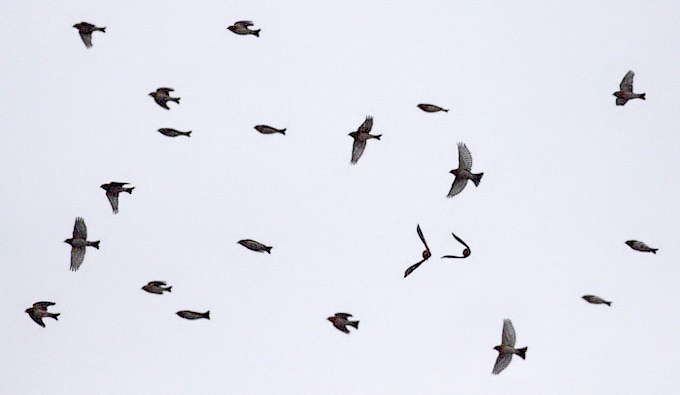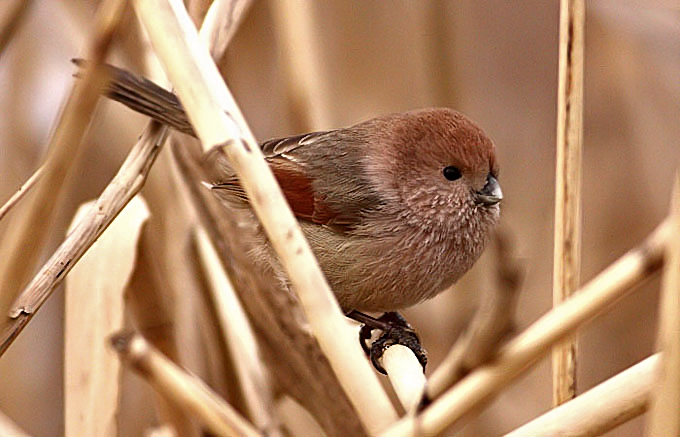 | E-mail to Birds Korea |
 | KWBS |
in the Region
 | The Oriental Bird Club |
 | BirdLife International (Asia) |
January
In occasional periods of extreme cold many smaller rivers and reservoirs freeze over. Temperatures often drop to -5°C at night, and stay near freezing in the day. Periods of light snow and severe cold are usually followed by milder temperatures for a few days, and then severe cold again.
Mid-winter specialties include Baikal Teal (in often huge concentrations) and Scaly-sided Merganser, Swan and Lesser White-fronted Goose, Steller’s Sea Eagle, Relict and Saunders’s Gulls and Solitary Snipe! Red-crowned and White-naped Cranes and Cinereous Vultures are concentrated in the Cheorwon basin, with Hooded Cranes at Seosan and Suncheon in the south, and huge numbers of ducks and geese at the Geum and in Haenam. Milder conditions on the southern island of Jeju allow species like Black-faced Spoonbill, White’s & Pale Thrushes, and even taivana Eastern Yellow Wagtails to over-winter. On the East coast, there are plenty of gulls to check through, and favoured seawatching areas such as the Guryongpo peninsula and north Gangwon Province provide chances to see Yellow-billed Loon, Long-billed Murrelet and Spectacled Guillemot along with occasionally large numbers of Ancient Murrelet and smaller groups of Rhinoceros Auklet.
National highlights in recent years have included Lesser Whitethroat, Asian Rosy Finch, Red-crested Pochard, and White-bellied Green Pigeon.
Recent Korean firsts in January have included a Plumbeous Water Redstart at Daejon in 2006, a Desert Wheatear at Pohang in 2008, and in 2009 the first and second records of King Eider, both on the East coast.
(The following records are a compilation of our own sightings and records sent in by other observers. As well as being posted on the Birds Korea website(s), selected records are also forwarded to other Korean-language birding websites; records of threatened species are arranged and forwarded to Birdlife International and national authorities when appropriate; flag images and records are passed to bodies responsible for their coordination throughout the flyway; and all records sent to us are used to compile annual reports and to support the evolving understanding of the status of many of Korea’s birds.)
Busan & Joonam Reservoir, January 31
In much calmed and rather milder conditions (with a minimum of only -4C and a maximum of +4 C), the day went excellently with scope views of Pale Thrush and both male and female Grey Bunting, followed by prolonged though rather distant views of two First-winter Relict Gull at the Nakdong Estuary and a Hooded Crane (together with c 120 White-naped Crane) at Joonam, where also the day's second Red-flanked Bluetail in addition to an Amur Leopard Cat (found by Arthur Blakemore).
Guryongpo- Gyeongju, January 30
More sub-zero and windy weather, preventing any good views of the 100-200 Ancient Murrelet seen distantly at Guryongpo, where further highlights included a single raft of 600 Red-breasted Merganser (with several hundred more seen during the morning) and two (presumed) Red Phalarope flying low over the sea. On the drive towards Busan, two immature Steller's Sea Eagle were on the river near Gyeongju, along with Baikal Teal, while at the Nakdong Estuary there were very few birds indeed, including no sign of any hoped-for Relict Gull.
Jeju island, January 30
Another weekend of blizzard-like conditions on Jeju. In a fallow field near the coast, about 50 Buff-bellied Pipit foraged. At Hado, one of the overwintering Black-faced Spoonbills was seen uncharacteristically close to the road. Aside from the regular assemblage of winter waterfowl, ninety-three Bean Geese, a dozen Dusky Thrush, a Naumann's Thrush, and three personata Black-faced Buntings were also at Hado.
Near Kyorae, I was happy to finally catch up with about 30 Common Starlings that regularly overwinter there. Several hundred Rook were spotted nearby.
Back in Seogwipo, a Black-legged Kittiwake and three dead and oiled Black-throated Loons were spotted in the harbor.
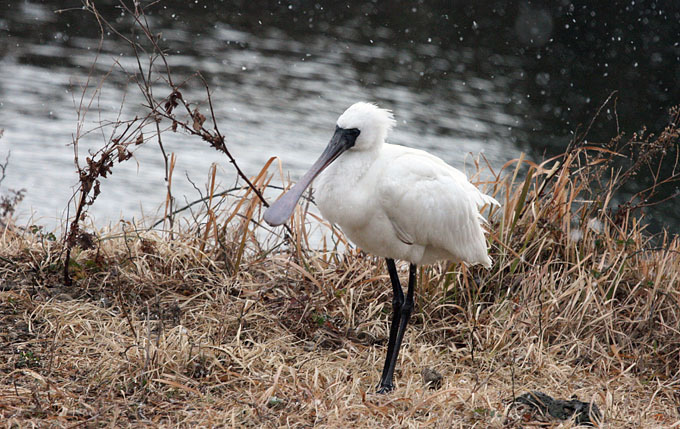
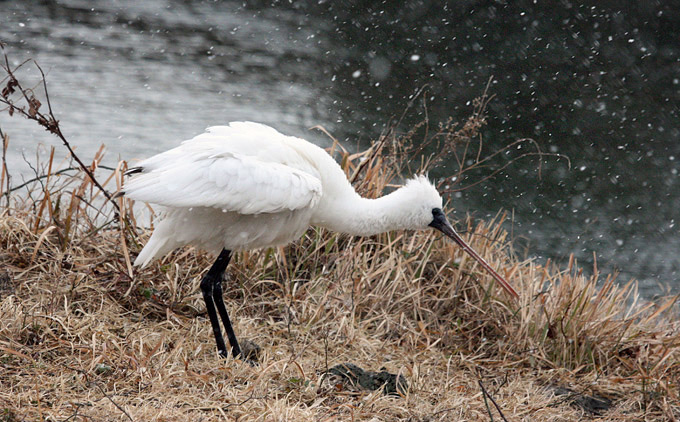
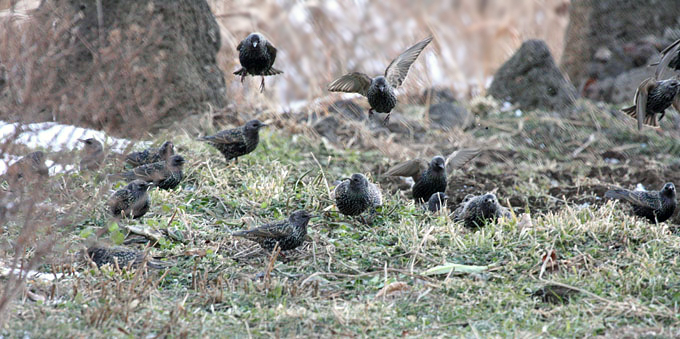
Geojin-East Coast (where joined by two other teams), January 29
Remaining well-below freezing all day, with a strengthening wind forcing the long-anticipated boat journey to be cut short. Best for the day were a Yellow-bellied Tit near the coast road (present for at least a week and re-found first by Dr. Shim's team, this is at least the 30th record of the species in the ROK - all since the first in 2005), a Long-billed Murrelet near the pension, and at least 10 Spectacled Guillemot and three Thin-billed Murre from the boat.
Yangyang - Geojin, January 28
Rather milder at the coast, with temperatures reaching a maximum of -1C or -2C. At Yangyang, best surprise was a roosting "Northern Scops Owl" (presumed semitorques), apparently warming itself in the sun. At Geojin, passerines included between seven and 11 Pallas's Rosefinch, two Red Crossbill, and the fairly ubiquitous (this winter at least) small groups of Brambling and Eurasian Siskin.
An hour or two scanning the sea there produced no Ancient Murrelet at all - however, there were at least 20 Spectacled Guillemot, five Brunnich's Murre, three Common Murre, one Long-billed Murrelet and five Rhinoceros Auklet.
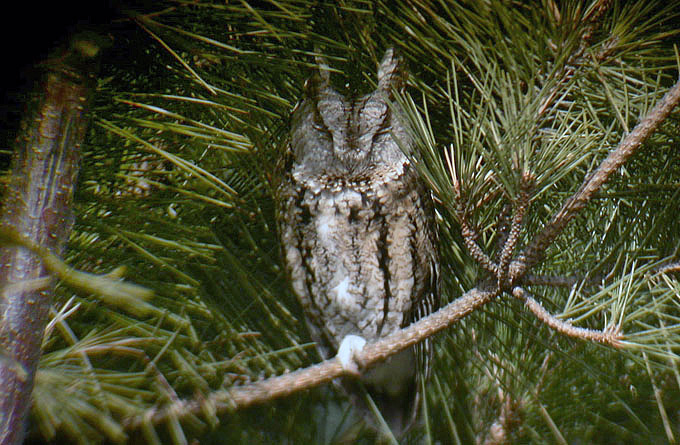
Cheorwon - NE River, January 27
- 24C at dawn, and a cold, 90 minute wait (fortunately in calm conditions) before several lines of White-naped Crane (containing >150 birds in total) and a dozen or so Red-crowned Crane arrived, carrying with them an adult Common Crane. At the same site, several Pallas's and Long-tailed Rosefinches seen and a Chinese Nuthatch heard, with best of all what was identified as an asiaticus Eurasian Nuthatch (based on its snow-white underparts with only a faint buff wash on the flanks, and its rather slender and short-looking bill compared to the amurensis Eurasian Nuthatch also present).
At the NE River, only one Scaly-sided Merganser (an adult male) - this area is increasingly degraded and disturbed, with a new port or bridge being built, in addition to the road-widening and vegetation removal.
Song Do-East & Seoul-Arboretum, January 26
-10C at dawn, rising to -3C during the day. With the seawall half-completed at the last main tidal-flat at Song Do, best on the ice floes and shore were only a handful of Far Eastern Oystercatcher and c 100 Eurasian Curlew.
In East Seoul, two adult Steller’s Sea Eagle watched excellently, with support species there including Meadow (15+), Little (1) and Pallas’s Reed Buntings (3), while at the arboretum at least four Solitary Snipe, two Pallas’s Rosefinch and one or more White-backed Woodpecker.
East Busan, January 23
At least five Grey Bunting in the main gulley still, including one adult male and several first-winters, including one photographed superbly by a Birds Korea member.
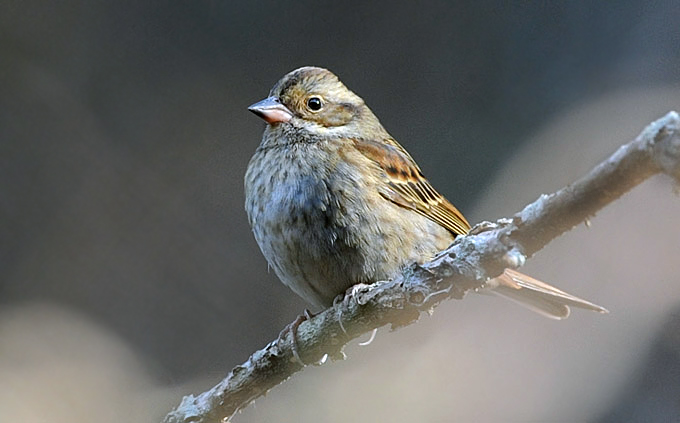

Dongmak, January 22
Notable at the (frozen) Dongmak lagoon today 8 Falcated Teal (a first for this site), 2 Wigeon (rarely recorded here) and also interesting, a long line of 184 Great Cormorant flying in V-formation high overhead at dusk.
Also today e.g. a Winter Wren, 2 Naummann's Thrush, plenty Common Pochard, 2 Coot, 2 Gadwall, 2 Common Shelduck and of course the resident Mongolian Gulls.
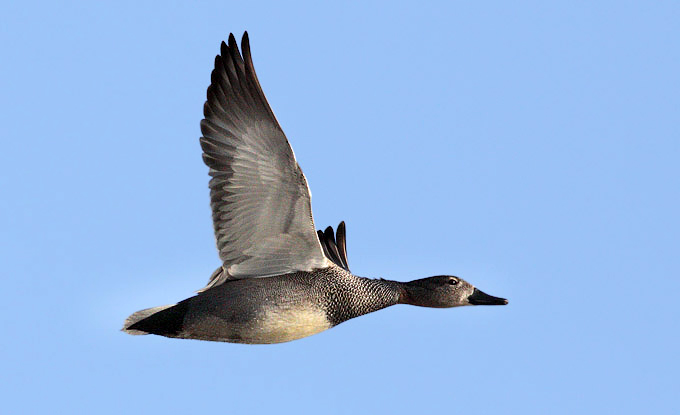
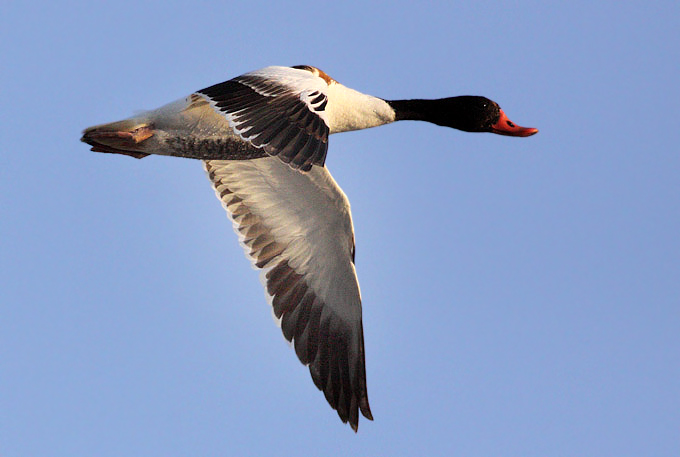
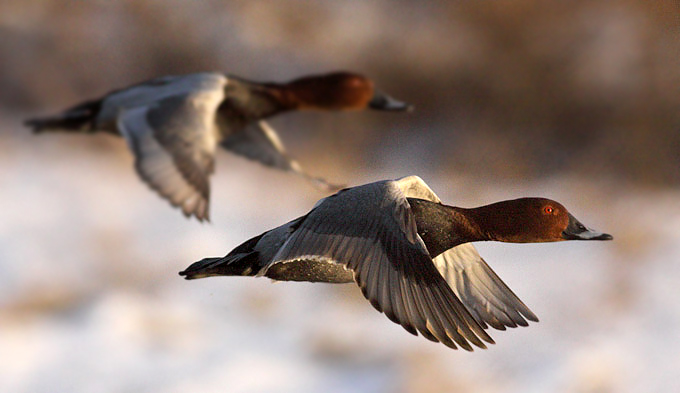
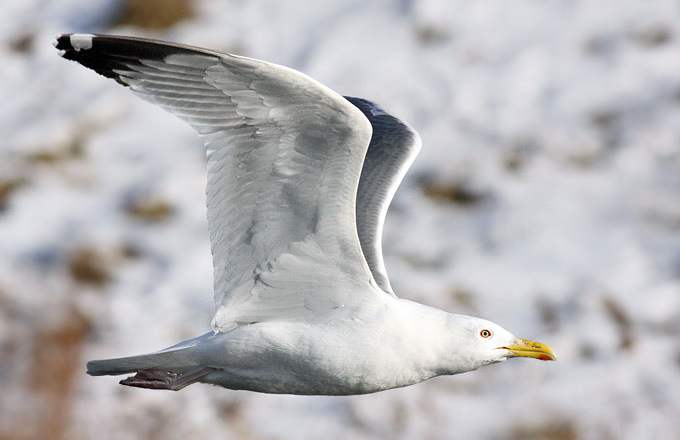
Namgang, Jinju, January 19
With its tributaries iced over, the unfrozen Namgang above and below the Geumsan Bridge was covered with innumerable water birds this afternoon. In particular, I noted over 100 pairs of Northern Shoveler. Some Cinereous Vultures rested or drank on the sandy banks.
And we are pleased to welcome rare visitors to Korea, five Mute Swans, an increase of three over last year. They fed calmly in mid-stream soaking up the sun.
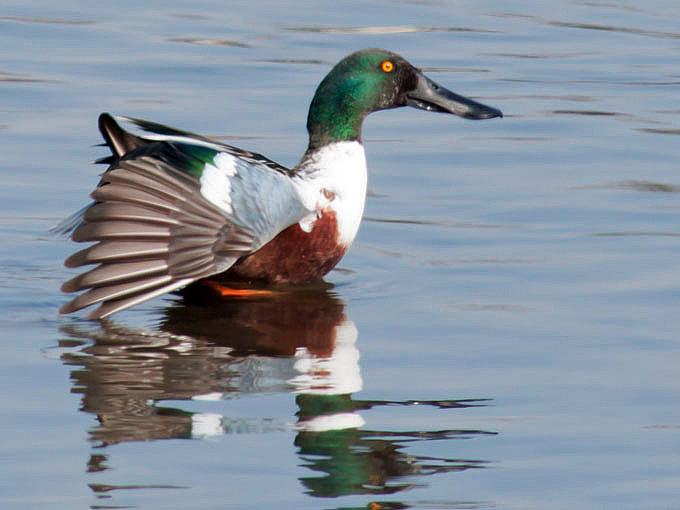
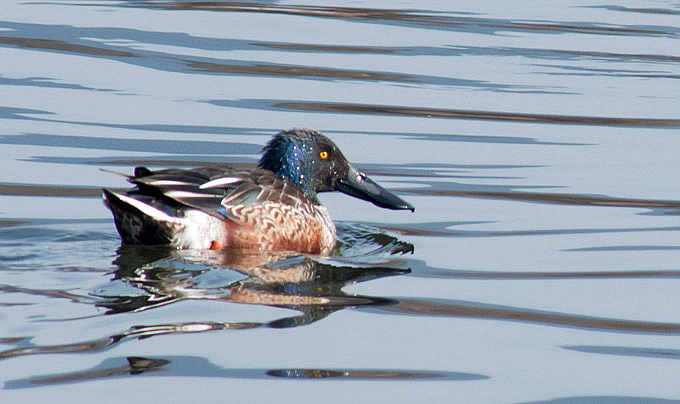
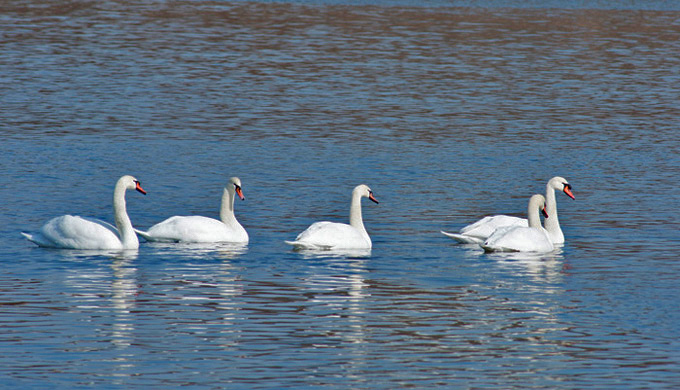
Jeonkok and Arboretum, January 17 and 18
-18 C at dawn both days. Despite the cold, great views of several Siberian Accentor and at the arboretum five Solitary Snipe and several Pallas’s Rosefinch.
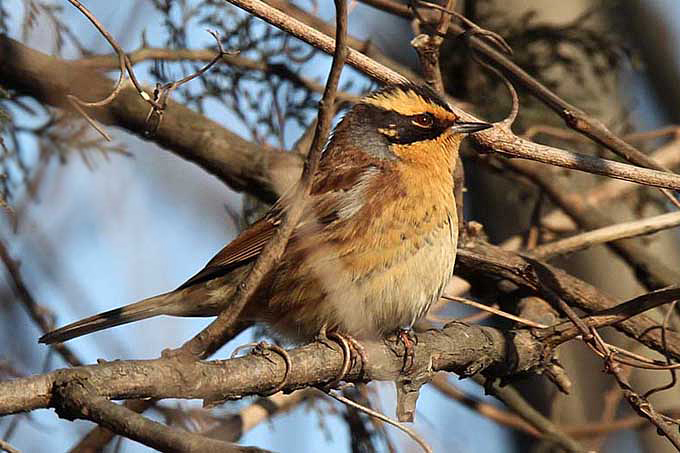
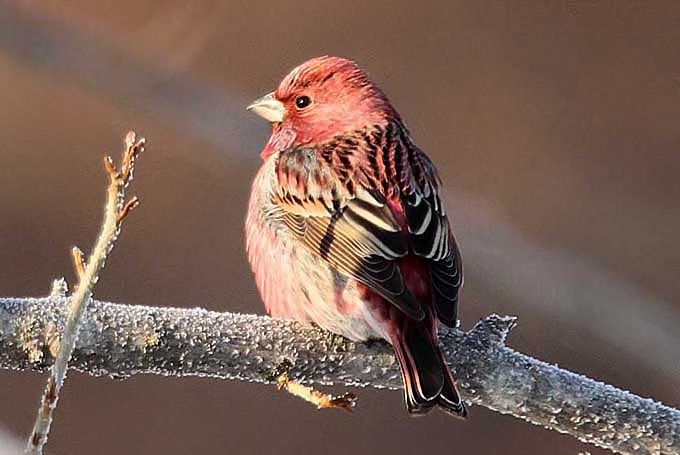
SE River, January 18
Approximately 15 Scaly-sided Merganser in remaining unfrozen stretches of river.

Joonam Reservoir, January 20 and 21
125 White-naped and two Hooded Cranes, four Japanese Waxwing and, most un-seasonal over the frozen reservoir, a single Eurasian Hoopoe.
Jeju Island, January 15
In spite of Blizzard-like conditions on Jeju, we had a great day of birding along the northeast coast. In a golf course pond, perhaps 200 Mandarin Duck huddled on the bank. Along the coast several Dunlin, Kentish Plover, Common Sandpiper, Little Grebe, and White Wagtail were seen. Four Black-necked Grebe braved heavy surf, while a nearby assemblage of more common gulls held a Heuglin's Gull, as well as a Glaucous Gull. A Common Goldeneye bobbed in a small harbor. A Western Osprey, a Rook, and a half-dozen Carrion Crow (which favor a small stretch of northeast coast) were also seen on the drive down the coast.
Smaller numbers of ducks were seen at Hado, when compared to the previous two Januarys. About 20 Common Shelduck, a like number of Northern Shoveler, a hundred Spot-billed Duck, a similar number of Pochard, 50 Mallard, two dozen Northern Pintail, and several Eurasian Teal, Gadwall, and Tufted Duck were seen there. Also at Hado were the 15 overwintering Black-faced Spoonbill, several dozen Coot, and about 20 Northern Lapwing.
Further down the coast near Seongsan, 4 Falcated Duck, several more Northern Pintail, Pochard, Common Goldeneye and Northern Lapwing, about a dozen Common Merganser, and a possible Northern Harrier. There has been a noticeable lack of loons on Jeju this winter.
Earlier in the week in Seogwipo (MP only), a riverside park held about 50 Mandarin Duck, a dozen Pale Thrush, two dozen Dusky Thrush, a White's Thrush, a female Red-flanked Bluetail, several Daurian Redstart, while plentiful Great Tits and Japanese White-eyes made the bushes come alive. There has been a Eurasian Siskin explosion on Jeju this winter. In 2009, I saw none, in 2010 I spotted several, whereas this year I have noticed large flocks (40+) in several locations.
In a farmer's field at Hanon Crater, a massive Greater Spotted Eagle lazily fled from the relentless attacks of a Eurasian Magpie. An Eastern Buzzard also glided over the field.
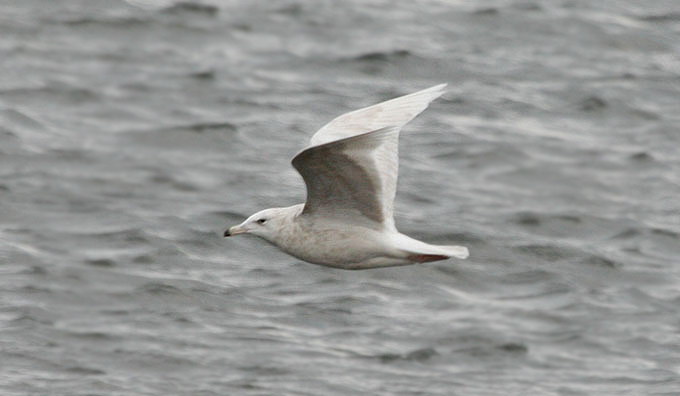
Busan, January 15
Ten or more Grey Bunting still (though no sign of last week’s Tristram’s and rather reduced numbers of Brambling, (which peaked at c 3000 a week earlier).
In addition, offshore there was a single Long-billed and 85 Ancient Murrelets.

Dongmak, January 8
The only birds of note at Songdo’s Dongmak Lagoon this afternoon were c.100 Brambling: otherwise the usual wintery selection of characters such as Common Shelduck, Vinous-throated Parrotbill, Ruddy Shelduck, a Peregrine, Eastern Buzzard, Kestrel, etc.
